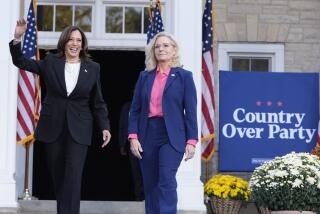Poles Apart, but Separated by Just a Few Blocks
- Share via
DAVENPORT, Iowa — President Bush and Democratic challenger John F. Kerry campaigned just blocks apart in this Mississippi River city on Wednesday in a striking display of the precisely targeted hunt for votes in the country’s most fiercely contested states.
With hundreds of journalists, Secret Service agents and staff in tow, Bush and Kerry in effect split this small city in two, leaving a narrow buffer downtown between their security zones.
The candidates’ close encounter came four days after their rival motorcades came within about 30 miles of each other in western Pennsylvania, another battleground state.
In their simultaneous Davenport stops, Bush and Kerry clashed over the economy and Iraq. While Bush spoke to 5,000 cheering supporters at an outdoor rally on the riverfront, Kerry held an economic forum indoors with business leaders -- an event designed to showcase his endorsement by about 200 executives at major national corporations.
Kerry said Bush’s handling of the Iraq war had cost America jobs.
“Most people think when we talk about Iraq or foreign policy that we’re just talking about foreign policy, but we’re not,” the Massachusetts senator told his invited guests. “We’re talking about stability in the marketplace. We’re talking about how people look at America, and whether or not they’re willing to do business with us. We are losing jobs to other people because of the attitude toward the United States today.”
Bush said at his rally that when it came to creating jobs, “We are turning the corner and we’re not going back.”
“What I’m telling you is, after four more years, the economy will be better,” he told the crowd gathered under gray skies. “More small business owners will be in America. Better and higher-paying jobs will exist here. And our farmers will be able to put something aside for future generations.”
Bush said his “well-timed” tax cuts had fueled recent job growth in the country.
Still, in a state that has lost 33,000 jobs during his presidency, the economy could pose a hurdle to Bush’s chances of carrying Iowa. In 2000, he lost the state to Al Gore by about 4,000 of the 1.3 million votes cast.
Kerry took note of his proximity to Bush and the president’s frequent assertions that the economy had “turned the corner.”
“I don’t know how many of you know that President Bush is just a few blocks from here,” Kerry told his listeners. “It occurred to me that he could come here for a great discussion about America’s future, if he were really willing to just turn the corner.”
Bush, wearing short sleeves and no tie, expressed confidence he would win Iowa and its seven electoral votes in November. “We were close in Iowa last time; not this time,” he said. “We’re going to carry it.”
One reason both candidates came to Davenport was that it had a large number of voters unaffiliated with either party. And even some of its registered Republicans and Democrats are known for their independent views.
Charlie Brooke, the Republican mayor of Davenport who addressed Bush’s rally before the president arrived, is among those.
Brooke told reporters he viewed Kerry as too liberal and out of touch with average people. But he said he might still vote against Bush because Vice President Dick Cheney “isn’t representative of the country.”
“I guess I consider myself to be somewhere between these two presidential candidates,” Brooke said.
At his forum, Kerry described himself as a fiscal conservative, a contention the Bush campaign had strongly disputed.
Kerry sought to undercut the GOP argument that he would be fiscally irresponsible as president by saying corporate tax cuts he had proposed -- along with more spending on job-training, health, education and other areas -- could be offset by scaling back other programs, closing business-tax loopholes and repealing Bush’s tax cuts for the wealthiest Americans.
He sought to validate his economic credentials with the new endorsements from business leaders. Five of them appeared with him in Davenport: Peter Chernin, president and chief operating officer of News Corp.; Bank of America Chairman Charles K. Gifford; Oracle software company President Charles E. Phillips Jr.; Penny Pritzker, president of Pritzker Realty Group; and Owsley Brown, chairman and chief executive of Brown-Forman Corp., the Kentucky liquor company that makes Jack Daniel’s whisky.
Several of them cited the burgeoning federal budget deficit as a key reason for opposing Bush and backing Kerry. They voiced concern that Bush’s pursuit of the Iraq war had harmed U.S. economic interests by stirring anti-Americanism and creating global instability.
“We need to work with other countries around the world; we can’t boss them around,” said Gifford, who described himself -- and Kerry, presumably to the campaign’s chagrin -- as a “liberal from Massachusetts.”
While many on Kerry’s list of business backers were Democratic stalwarts -- such as Sherry Lansing of Paramount Pictures and Jeffrey Katzenberg of DreamWorks -- it also included a handful of former Bush supporters, including Brown.
Bush, in his remarks, offered a lengthy defense of his decision to invade Iraq. He called former Iraqi dictator Saddam Hussein “a brutal tyrant who hated America, had ties to terror, had used weapons of mass destruction, might use those weapons or share his deadly capabilities with our enemies.
“We saw a threat,” he said.
More to Read
Get the L.A. Times Politics newsletter
Deeply reported insights into legislation, politics and policy from Sacramento, Washington and beyond. In your inbox twice per week.
You may occasionally receive promotional content from the Los Angeles Times.









